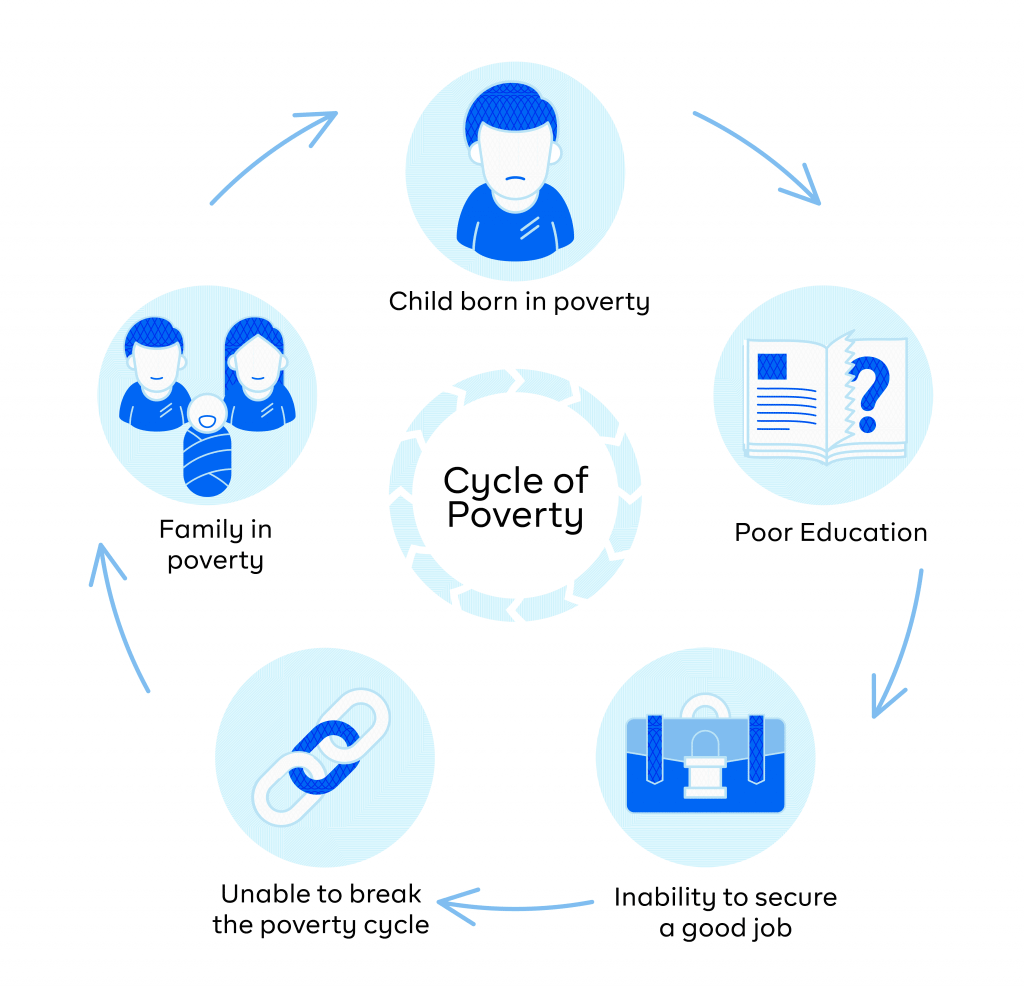
If you grew up poor, one of your life’s missions would be to ensure that you don’t die poor or that your kids do not grow up poor. You will most likely live life knowing at the back of your mind that you are not just working hard to make money for ice cream and burger but to escape the cycle of poverty. It’s possible that your grandparents were poor and your parents were also poor. Now it’s your turn. And you don’t just want to get by, survive or live from hand to mouth. You actually want to be wealthy. You want to have enough and more than enough. But is it really possible for you to escape this generational poverty?
What is generational poverty?
According to the Encyclopedia of World Problems, “generational poverty, also known as cycle of poverty is a poverty trap caused by self-reinforcing mechanisms that cause poverty, once it exists, to persist unless there is outside intervention. It can persist across generations, and when applied to developing countries, is also known as a development trap.”
In a nutshell, if you’ve noticed that a particular family has been poor for two to three generations, it’s safe to say they are experiencing generational poverty. Here’s a story to show what I mean:
Bola is born into a poor family. Her parents are uneducated so they cannot get high-paying jobs. With the little they have, they send Bola to primary school and secondary school. However, they cannot continue to the tertiary level because they do not have the resources for that. As a result, Bola learns an old-fashioned skill and begins to earn little. Soon, Bola gets married to someone in a similar social and financial class and gives birth to two children. These two children also go to primary school but because Bola’s skill is not in demand, she is not making enough money to sponsor them in secondary school. And her husband is also not earning enough. As a result, Bola’s kids also drop out after primary school. And on and on the cycle of poverty continues and is passed down from generation to generation, just like genetics.

So is it really possible to escape generational poverty? How?
The answer to this question is yes. It is very possible to escape poverty. Although the numbers show that one is less likely to escape generational poverty unless there is an external factor that comes in, there are still people escaping poverty right now as we speak. According to the World Poverty Clock, every minute, less than three people escape poverty in Nigeria. That’s less than 60 people every hour. That’s less than 1440 people every single day.
So, to answer the question, is it really possible to escape poverty? The answer is yes, it is possible.
Before we explore how and what exactly causes generational poverty? It is important to not just list ways people can escape poverty but to also ensure that you know how people get into this in the first place.
What causes Generational Poverty?
The easiest answer to this is ‘lack of money’. But generational poverty is much more complicated than that. In most cases, that someone is poor does not mean they do not have money. It usually means they cannot keep money hence they cannot build wealth hence they cannot escape poverty. There is a name for this phenomenon and it’s called the Boots Theory.
Boots Theory
This theory explains why many people who are born into poverty remain in poverty. According to the Boots theory, the poor actually spend more than the rich. It says, “The reason that the rich were so rich, was because they managed to spend less money.”
How? Let’s use boots to explain. Imagine a good boot that will last a year or two costs N10,000. The rich can easily take out N10,000 to buy this good and durable boot. However, the poor cannot do this. So they buy a less expensive boot for N5000. This boot is cheaper but is also not durable. So in six months, the boot gets torn and they fix it for N500. In one year, the boot is completely useless. They buy another one for N5000. After six months, they fixed it again for N500. Now, they’ve spent more money than the rich but they’ve spent it on less durable boots. So in two years when the rich are just repairing their boots for the first time, the poor are buying their third pair of boots just because they could not afford to buy a boot for N10,000 at once.
This theory does not just apply to footwear. It applies to almost every aspect of life and it shows why a poor person would keep spending more without knowing it. Another common example is that of the rich person who owns a refrigerator so they buy stuff in bulk and store up. Buying in bulk is always cheaper so they save more money. But the poor cannot afford to buy a refrigerator so they keep buying retail pieces which means they actually spend more.
1. Illiteracy
Lack of education is one of the major causes of poverty in Nigeria. But then, just as generational poverty is a vicious cycle, illiteracy can also be a vicious cycle. People are poor because they are not educated but then they cannot actually get educated because they are poor. It’s an endless loop.
2. Hopelessness
When you’ve been in poverty for so long, it’s easy to give up and just remain there. This is the reality for some people battling generational poverty. And because of this, the poor focus on just surviving today without planning much for tomorrow. They’ve given up on ever getting out and this in itself can be the reason why they never get out.
3. Family size
Research shows that large families are less likely to afford education for all their children. This means these kids will most likely end up with low-paying jobs and then repeat the cycle again. More children means more mouths to feed which means limited resources are spread thin across the family members.
4. Black Tax
This is relatable for most Nigerian adults. Black Tax is an unspoken rule in most Nigerian families. It is the amount you send off to your parents, siblings, cousins, nieces, nephews, grandparents, aunts, uncles and other members of the extended family for their upkeep and other reasons. For someone who is just struggling to come out of poverty, black tax can cripple your efforts and keep you in the trenches.
There are other external factors that cause and reinforce generational poverty such as recession, pandemics, and natural disasters. However, let’s focus on what we can control.
How can you escape generational poverty?
1. Educate yourself
This is not limited to traditional primary, secondary and tertiary education. If you are reading this on a mobile device or laptop that means you have a certain degree of education. Reading this blog is part of the education you need to escape poverty. Money can be such a complex topic if you do not find someone to explain it to you. This does not only make it hard to actually make money. It makes it super hard to keep money and build wealth. Education exposes you to different possibilities and also shows you what may be working against your money. Having a full understanding of concepts like the Boots theory, Parkinson’s Law and similar concepts can help you avoid obvious traps that keep people in poverty. If illiteracy is one of the major causes of poverty, then education is one of the major solutions.
2. Have a positive attitude
According to WikiHow, “Poverty is about a lack of money, but also a lack of hope. People living in poverty often feel powerless to change their situation.”
When you’ve grown up ‘not being rich’, there is a chance to just give up and not bother trying. This is especially possible when you realize that you need money to make money so it looks like you are eternally disadvantaged. But you are not. Having a positive attitude towards escaping generational poverty is very much needed to conquer the beast.
3. Get a marketable skill
Perhaps the first step to actually escaping poverty is making money. However, since money does not grow on trees, you will need to offer value in exchange for money. Value can be various things. If you are knowledgeable in a particular field, your knowledge can be the value you offer in exchange for money. This is what professors and academic scholars do. If you have a particular skill, this skill can be offered in exchange for money. In a tech-driven era like ours, digital skills are the hotcakes at the moment. So learning a digital skill can be a good way to start. And if you have a phone or laptop to read this, then you can get started.
4. Network and ask for help
Lack of money can isolate you from the very people that can actually help you. Help does not necessarily have to be monetary. Networking with people outside of your social circle can expose you to opportunities that can be the stepping stone out of poverty.

5. Get a mentor
This may be unexpected but you may actually need some mentorship on getting out of poverty. This does not have to be paid. It could be from an older and richer relative or a professional. A mentor could help with organising your finances, figuring out your career path and ensuring that you have a workable long-term plan to get you out of poverty.
6. Reduce black tax
When you finally start making some good money, now is not the time to think of increasing black tax so you can pay back your family. This could lead you right back to the same poverty you are trying to escape. Instead of increasing your black tax, you should actually reduce it. Giving money out just as quickly as it comes will lead to poor retention. You may eventually realise that you are making more money but still do not feel financially secure.
7. Avoid lifestyle inflation
A trap most people who are escaping poverty fall into is lifestyle inflation. This happens when someone increases their spending when their income increases. As someone who is fighting generational poverty, you do not want to fall into this trap. Now is not the time to increase your expenses. Instead, now is the time to start saving and investing so as to ensure you don’t fall back into poverty. Put structures and systems in place that allow for long-term wealth building.
8. Marry smartly
Research shows that early marriage can be a factor that increases the risk of remaining in poverty, especially for women. The reason for this is not farfetched. Marriage most times means children which means more mouths to feed. It also means less mobility which could mean restricted access to employment in distant places as you now have to consider your family. Most times, marriage also means a hold on further education. However, there are cases where marriage can be a good thing. ‘Marrying up’ is one of them. That is, marrying someone who is in a higher financial circle than you are. This could increase your chances of escaping poverty. Also, if you marry and have a smaller family, you are more likely to ensure that you end the cycle of generational poverty in your family.
While money should not be the sole factor in choosing a marriage partner and a wedding date, considering your current financial situation is the smart move to make before getting married.
9. Stay healthy
Health is wealth and disregarding this simple rule of life can be costly. Staying healthy can help you avoid huge medical bills. Eating healthy, avoiding life-threatening acts like smoking and many other hacks can be of help to you.
10. Pay off debt systematically
If you’ve incurred some debt while struggling to escape poverty, the next thing you probably want to do is get rid of these debts. While your heart is in the right place, there is a smart way to pay off debt. If not done properly, paying off debt can lead you into more debt. Read this article on how to get out of debt.
11. Save and invest
This is the highlight of it all. If you do implement everything above and you do not set money aside to invest, you are bound to return to poverty. Remember, being wealthy is not about having money. It is about keeping money. Start here with savings and investments.
There are other ways to escape poverty, and some of them are dependent on the government, like encouraging female education, etc. While we wait for the government to do their part, you can also do your part to wage the war against generational poverty – and win.
Are you ready to escape poverty now? Let’s help you do it. Sign up on Cowrywise.
